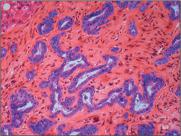当前位置:
X-MOL 学术
›
Lancet Oncol.
›
论文详情
Our official English website, www.x-mol.net, welcomes your feedback! (Note: you will need to create a separate account there.)
FGFR inhibitors for advanced cholangiocarcinoma.
The Lancet Oncology ( IF 51.1 ) Pub Date : 2020-03-20 , DOI: 10.1016/s1470-2045(20)30152-2 Tian Yang 1 , Lei Liang 1 , Ming-Da Wang 1 , Feng Shen 1
The Lancet Oncology ( IF 51.1 ) Pub Date : 2020-03-20 , DOI: 10.1016/s1470-2045(20)30152-2 Tian Yang 1 , Lei Liang 1 , Ming-Da Wang 1 , Feng Shen 1
Affiliation

|
The prognosis of advanced or metastatic cholangiocarcinoma is extremely unsatisfactory, mainly owing to few treatment options and poor responses to conventional chemotherapy regimens. Since 2007, advances in next-generation sequencing have substantially improved the ability to understand the complex molecular mechanisms underlying the progression of cholangiocarcinoma. The most promising target for cholangiocarcinoma identified in recent years is the fibroblast growth factor (FGF) signalling pathway, which consists of 22 human FGFs and four transmembrane receptor tyrosine kinases (FGF receptors [FGFRs] 1–4). Fusions, rearrangements, translocations, and amplifications of FGFR genes are closely related to the initiation and progression of some cancers. FGFR2 mutations have been identified in nearly 20% of all cholangiocarcinomas and targeting this kinase presents a novel and exciting therapeutic strategy against cholangiocarcinomas. Several FGFR-specific inhibitors are being assessed in clinical trials for FGFR-mutant cholangiocarcinomas, including non-selective and selective FGFR inhibitors.
中文翻译:

FGFR抑制剂用于晚期胆管癌。
晚期或转移性胆管癌的预后极差,主要是由于治疗选择少和对常规化疗方案反应差。自2007年以来,下一代测序技术的进步已大大提高了了解胆管癌发展过程中复杂分子机制的能力。近年来鉴定出的胆管癌最有希望的靶标是成纤维细胞生长因子(FGF)信号通路,该通路由22种人FGF和4种跨膜受体酪氨酸激酶(FGF受体[FGFRs] 1-4)组成。FGFR基因的融合,重排,易位和扩增与某些癌症的发生和发展密切相关。FGFR2已在所有胆管癌的近20%中鉴定出突变,靶向这种激酶提供了针对胆管癌的新颖而激动人心的治疗策略。在针对FGFR突变型胆管癌的临床试验中,正在评估几种FGFR特异性抑制剂,包括非选择性和选择性FGFR抑制剂。
更新日期:2020-03-21
中文翻译:

FGFR抑制剂用于晚期胆管癌。
晚期或转移性胆管癌的预后极差,主要是由于治疗选择少和对常规化疗方案反应差。自2007年以来,下一代测序技术的进步已大大提高了了解胆管癌发展过程中复杂分子机制的能力。近年来鉴定出的胆管癌最有希望的靶标是成纤维细胞生长因子(FGF)信号通路,该通路由22种人FGF和4种跨膜受体酪氨酸激酶(FGF受体[FGFRs] 1-4)组成。FGFR基因的融合,重排,易位和扩增与某些癌症的发生和发展密切相关。FGFR2已在所有胆管癌的近20%中鉴定出突变,靶向这种激酶提供了针对胆管癌的新颖而激动人心的治疗策略。在针对FGFR突变型胆管癌的临床试验中,正在评估几种FGFR特异性抑制剂,包括非选择性和选择性FGFR抑制剂。

























 京公网安备 11010802027423号
京公网安备 11010802027423号